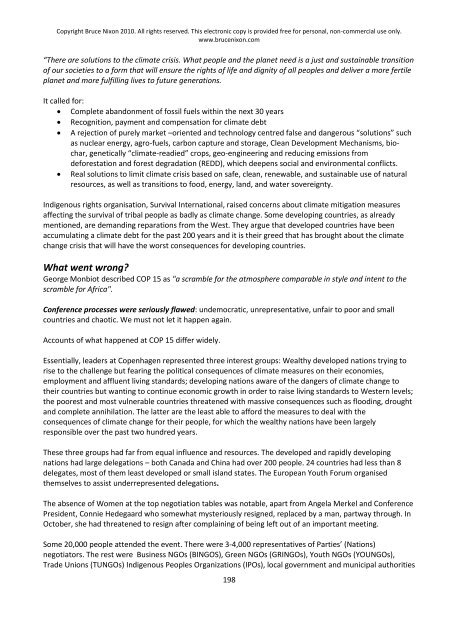A better world is possible - Global Commons Institute
A better world is possible - Global Commons Institute
A better world is possible - Global Commons Institute
You also want an ePaper? Increase the reach of your titles
YUMPU automatically turns print PDFs into web optimized ePapers that Google loves.
Copyright Bruce Nixon 2010. All rights reserved. Th<strong>is</strong> electronic copy <strong>is</strong> provided free for personal, non-commercial use only.<br />
www.brucenixon.com<br />
“There are solutions to the climate cr<strong>is</strong><strong>is</strong>. What people and the planet need <strong>is</strong> a just and sustainable transition<br />
of our societies to a form that will ensure the rights of life and dignity of all peoples and deliver a more fertile<br />
planet and more fulfilling lives to future generations.<br />
It called for:<br />
Complete abandonment of fossil fuels within the next 30 years<br />
Recognition, payment and compensation for climate debt<br />
A rejection of purely market –oriented and technology centred false and dangerous “solutions” such<br />
as nuclear energy, agro-fuels, carbon capture and storage, Clean Development Mechan<strong>is</strong>ms, biochar,<br />
genetically “climate-readied” crops, geo-engineering and reducing em<strong>is</strong>sions from<br />
deforestation and forest degradation (REDD), which deepens social and environmental conflicts.<br />
Real solutions to limit climate cr<strong>is</strong><strong>is</strong> based on safe, clean, renewable, and sustainable use of natural<br />
resources, as well as transitions to food, energy, land, and water sovereignty.<br />
Indigenous rights organ<strong>is</strong>ation, Survival International, ra<strong>is</strong>ed concerns about climate mitigation measures<br />
affecting the survival of tribal people as badly as climate change. Some developing countries, as already<br />
mentioned, are demanding reparations from the West. They argue that developed countries have been<br />
accumulating a climate debt for the past 200 years and it <strong>is</strong> their greed that has brought about the climate<br />
change cr<strong>is</strong><strong>is</strong> that will have the worst consequences for developing countries.<br />
What went wrong?<br />
George Monbiot described COP 15 as "a scramble for the atmosphere comparable in style and intent to the<br />
scramble for Africa".<br />
Conference processes were seriously flawed: undemocratic, unrepresentative, unfair to poor and small<br />
countries and chaotic. We must not let it happen again.<br />
Accounts of what happened at COP 15 differ widely.<br />
Essentially, leaders at Copenhagen represented three interest groups: Wealthy developed nations trying to<br />
r<strong>is</strong>e to the challenge but fearing the political consequences of climate measures on their economies,<br />
employment and affluent living standards; developing nations aware of the dangers of climate change to<br />
their countries but wanting to continue economic growth in order to ra<strong>is</strong>e living standards to Western levels;<br />
the poorest and most vulnerable countries threatened with massive consequences such as flooding, drought<br />
and complete annihilation. The latter are the least able to afford the measures to deal with the<br />
consequences of climate change for their people, for which the wealthy nations have been largely<br />
responsible over the past two hundred years.<br />
These three groups had far from equal influence and resources. The developed and rapidly developing<br />
nations had large delegations – both Canada and China had over 200 people. 24 countries had less than 8<br />
delegates, most of them least developed or small <strong>is</strong>land states. The European Youth Forum organ<strong>is</strong>ed<br />
themselves to ass<strong>is</strong>t underrepresented delegations.<br />
The absence of Women at the top negotiation tables was notable, apart from Angela Merkel and Conference<br />
President, Connie Hedegaard who somewhat mysteriously resigned, replaced by a man, partway through. In<br />
October, she had threatened to resign after complaining of being left out of an important meeting.<br />
Some 20,000 people attended the event. There were 3-4,000 representatives of Parties’ (Nations)<br />
negotiators. The rest were Business NGOs (BINGOS), Green NGOs (GRINGOs), Youth NGOs (YOUNGOs),<br />
Trade Unions (TUNGOs) Indigenous Peoples Organizations (IPOs), local government and municipal authorities<br />
198
















